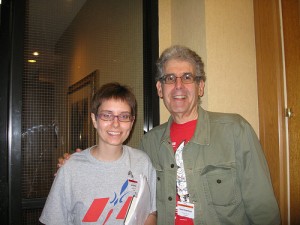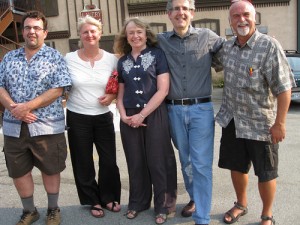Follow Scott
Recent Tweets
- Waiting for Twitter... Once Twitter is ready they will display my Tweets again.
Latest Photos
Search
Tags
anniversary Balticon birthdays Bryan Voltaggio Capclave comics Cons context-free comic book panel conventions DC Comics dreams Eating the Fantastic food garden horror Irene Vartanoff Len Wein Man v. Food Marie Severin Marvel Comics My Father my writing Nebula Awards Next restaurant obituaries old magazines Paris Review Readercon rejection slips San Diego Comic-Con Scarecrow science fiction Science Fiction Age Sharon Moody Stan Lee Stoker Awards StokerCon Superman ukulele Video Why Not Say What Happened Worldcon World Fantasy Convention World Horror Convention zombies
©2025 Scott Edelman
Readercon 2008: Sunday
Posted by: Scott
Tags:
Readercon
Posted date:
July 21, 2008 |
No comment
Even though Sunday was one of the shorter days at Readercon, it was actually the busiest day for my personal programing.
Once I checked out of the hotel and parked my bag, I went to my 10:00 a.m. panel, “I’m Not Terse, I’m Just Edited That Way,” which in addition to me featured Barry Malzberg, Lucy Corin, Richard Chwedyk, and Ron Drummond. Kathryn Morrow acted as moderator, and I made it difficult for her to maintain order. Our mandate was to discuss the controversial relationship between writer Raymond Carver and editor Gordon Lish, the man who made his career. The panel description also tossed out the name of Robert Heinlein, who many feel became uneditable as he became more successful.
I was seated next to our moderator, and I’m afraid that when I got a chance to speak, the first panelist to do so, I began with something of a rant. I am very passionate about Carver, and so I’m afraid that it couldn’t be helped.
A decade or so ago, when the New York Times published in its Sunday magazine section its shocking article revealing the true nature of the Lish/Carver relationship, my understanding of the arc of Carver’s life changed completely. I’d always thought that the reason he’d eventually began publishing richer, deeper stories was because the love of a good woman had rescued him from his alcoholism. Instead, it seemed that the real reason his writing improved was because he’d finally developed the strength to throw off the shackles of his editor.
Take the stories “The Bath” and “A Small Good Thing.” It was presented to the world that the latter story was a revision of the former one, that Carver had simply decided to revisit the theme and expand his story. But the latter was not a revision, but rather a de-Lishifying, a removal of the edits, a return to the warmth which had always been there but which Lish could not abide. (I could go on—believe me, I could go on—but I’ll shut up here for now and point you to my earlier post on Carver, which quotes some of the Lish/Carver correspondence.
By this point, I may very well may have been frothing at the mouth, and had fight hard to suppress myself to avoid stealing all of the panel’s time. I hate microphone hogs, and didn’t want to find myself becoming one of them. But when it came to Carver, I couldn’t control myself.
Barry Malzberg, who was the only one there to have been personally edited by Lish, was the next to speak (when I finally yielded the floor, that is), and he rose to the man’s defense. Lish may not have done what was best for the writer, he said, but he did what was best for the magazine. To an editor, what was most important was the consistency of the magazine’s voice, and Lish protected that. Barry shared that Lish had edited one of his submissions for Esquire, then sent it back, harshly cut and rearranged, with perhaps 30% of the story gone. Lish asked him to retype it and resubmit it, with the hopes that Lish could get the story past the powers that be. Which Barry did, only to have the story bounced anyway. Barry subsequently sold the story to F&SF (I think), and claimed that it was a better story for Lish’s hand.
I contrasted Lish with Horace Gold, who also ruled with a dictatorial hand, and who nearly destroyed “Flowers for Algernon” with his insistence on a happy ending. So not all dictators are equal. All Lish was, I said, was Gold plus talent.
As for me, I’d personally rather publish a good story that says what I intended it to say than a great story that says the opposite of what I’d intended. I’d rather be hated for what I am than loved for what I am not.
The one thing I failed to say, which comes to mind now, is an old quote which I’ve heard attributed to Tony Bennett, which goes something like this—what they called my flaws when I was young, they call my style now that I’m older and successful. I’d hate for an editor to make a writer more palatable by removing that uniqueness.
I should add that I don’t want any of the editors out there to think I’m dismissing those good editors who are helping writers achieve their visions and to say what they want to say. My problem is with those editors who change the point of their writers’ stories until they say the opposite of what was originally intended.
I could go on for thousands more words about Carver … but I won’t. (And forgive me for not quoting Ron,i, and Lucy as well, for they certainly also had important things to say on the matter—but how much of this subject do I dare to inflict upon you?)
Immediately after that panel, I read my short story “A Very Private Tour of a Very Public Museum,” which will be out in two months in the Summer 2008 issue of Postscripts magazine. I was pleased to see that Val Grimm (above), who had given my last Postscripts story such a stellar review, was in attendance.
I only had an hour for lunch before the panel after that, and so rushed to the bar with Fiona Kelleghan and Rob Sawyer. We were joined there by Brett Cox and Jeanne Beckwith.
At 1:00, I participated in a panel titled “Finding Hamster Huey’s Head: The Nature of the Childhood Short Story,” where I was joined by Shira Daemon, Sarah Beth Durst, Louise Marley, and Ann Tonsor Zeddies. I took the position that, just as C. P. Snow had said that patriotism was only the love of the food that we ate as children (if I’m misattributing that quote, please let me know—I’d already given Carson McCullers credit for a Flannery O’Connor quote on a panel this weekend), our love of literature is nothing more than the resonances of the books we loved as children.
Paul, Deb, and I dashed off immediately at the end of my panel so we could get back to Providence in time to pick up Brownie from the dog sitter. As we drove, we gave the con a postmortem, which, no, you don’t get to hear about. Once back on Poplar Street, I took a brief nap, which only ended when a cat walked up the length of my body and sat on my head.
But, as they say in the commercials, that’s not all!
Ever since I started flying into and out of Providence instead of Boston to get to Readercon, the three of us have had a tradition of eating a farewell dinner at Wes’ Rib House as a way of extending the con even further. Often local writers and fans join in. This year, in addition to Don and Sheila D’ammassa, Dan and Sandy Pearlman, and Mike Blake, we were joined by Pete and Nikki Crowther, who had been in the area attending Necon rather than Readercon, and who were about to vacation with Paul and Deb for four days before heading home to the UK. (That’s Paul, Nikki, Deb, and Pete with me above.) It was great to get some time with Pete and Nikki, two of the nicest people in the world, whom I can’t see often enough.
And now that I’ve posted this entry (as well as my complete set of photos), Readercon really is over. See you all next July!


